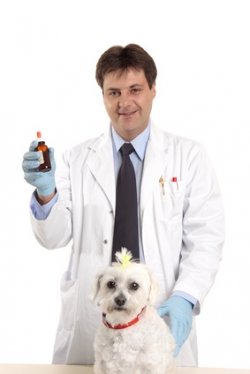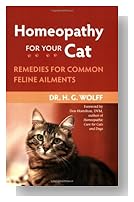Homeopathy For Pets
Homeopathy For Pets is a Safe Alternative Therapy. In this section we will look at how herbal remedies and alternative therapies can be used to treat your pet's illnesses as well as be used for keeping them healthy.
Many dogs and cats suffer from urinary tract infections for instance, that are often treated with antibiotic medicines when alternative homeopathy treatments can help to cure it and prevent it infecting your pet again.
Below we will feature some helpful information about the therapy as well as some examples of treatments you can consider using yourself for your pets.
Homeopathy is a Safe Alternative Therapy for your Pets

Homeopathy is popular amongst many pet owners, since it is a non invasive natural form of treatment which has no side effects.
The treatment modality known as homeopathy has been around for many
years, and was first identified in 1796.
The person who first
"discovered" homeopathy was Samuel Hahnemann, a German scientist.
It was very popular - in the early 1900's, there were 22 medical schools
in America, where people could learn homeopathy.
If a disease or
illness can be treated with conventional medication, homeopathy may also
help.
Hahnemann discussed the use of homeopathy in animals at the same time he
was learning the effects of his remedies on people, so veterinary
homeopathy has been around as long as human homeopathy.
Homeopathy takes the view that a disturbance in the body's vital force is the cause of disease and illness.
Disease is initially seen in the energy levels of the body, but then it
shows up as a physical symptom that you can identify.
Because of this,
you can't cure an animal of disease by just taking care of the physical
symptoms, they must also be treated at the energy level.
Practitioners of homeopathy believe that by giving small amounts of the
substances that cause the disease, the symptoms can be cured.
This is
often described as "like cures like".
The emotional well being, as well as all other aspects of an animal's
health, are taken into consideration when creating a homeopathic remedy.
Because of this, each homeopathic remedy is unique, and is prescribed
especially for an individual animal.
This means that even if an animal has the same symptoms as another, they
may need completely different remedies.
People who study homeopathy say
that disease symptoms shouldn't be suppressed, since it is the body's
way of trying to heal itself.
Synthetic, plant, and animal ingredients are used to create the homeopathic remedies .
These ingredients are diluted many times in distilled water or alcohol, and thoroughly shaken between dilutions .
Although there are no active
ingredients left in the remedy after the dilutions, the shaking is
thought to activate the energy of the ingredients, and it is this energy
that helps the body heal.
Homotoxicology is a slightly different branch of homeopathy.
This
treatment modality believes that diseases are caused by toxins, and
treatment involves the use small amounts of remedies to remove these
toxins from the body.
According to homeopaths, there are three things that can happen as a
result of treatment.
Firstly, the disease is suppressed, and will come
back once the remedy is not taken any more. This is called palliation.
The second possibility is that the first condition is suppressed, but a
different and completely separate problem develops.
The third
possibility is that the condition is cured, and will never come back.
The same can be said for most conventional treatments.
Pets can be treated using homeopathy for many conditions, including
bruises, bites and stings, abscesses, and problems giving birth.
However, because it works on an animal's energy levels, many people find
it particularly helpful in cases of emotional upset, such as separation
anxiety or storm phobia.
There are many veterinarians that do not believe in homeopathic
remedies, and it is a controversial subject for vets as well as pet
owners.
Because it is completely non toxic, you can try it on your pet
without any fear of harming them.
For conditions that are potentially dangerous and life threatening, such
as preventing heartworm disease, it is important that more conventional
medications are used.
Urinary Tract Infections in Dogs
If you’ve ever had a urinary tract infection then you will know how annoying and painful they can be, and they are just as annoying and painful for a dog or cat.
Dogs actually have urinary tract infections much more than humans do and the pain involved for them can often be excruciating.
The big problem with dogs too is that they can’t tell you that they are
in pain or where their pain is.
Older female dogs are especially
susceptible to recurring or chronic UTI as they age further.
A urinary tract infection in a dog can become quite serious if it isn’t
treated early. A UTI infection usually starts from the urethra and
bladder but if not treated it can travel upwards and cause an infection
in other organs.
UTI can also be associated with canine urinary incontinence and urine accumulation.
If a dog has abnormal urine accumulation this can lead to kidney damage, and possibly even kidney failure and death.
Young puppies will have problems with wetting and it can be caused by
over excitement.
If it is caused by over excitement it can be ignored but if it is a continued problem then it could possibly be a sign of a urinary tract infection.
If a puppy has a UTI infection then it could make it difficult to toilet train the puppy.
The signs of a urinary tract infection in a dog can be observed easily
and a check using urine culture will determine whether the dog has an
infection.
Prostatitis is common in male dogs with a urinary tract infection as the infection causes the prostate gland to enlarge
which then blocks the flow of urine.
When this happens, bacteria from
the urinary tract infection can begin to move through the bloodstream
toward other organs.
If the infection remains within the area of the prostate gland it can form an abscess which can cause problems itself so it is important that a diagnosis is made and treatment is given.
When bacteria enter the bloodstream it can develop into septicemia.
Bacteria can multiply and can affect any organ within the body.
Infection can even affect the heart valves and the lining of the heart
and also the intervertebral disks.
There is often an underlying reason that causes urinary tract infection
and that underlying cause needs to be dealt with otherwise the urinary
tract infections will recur.
Bladder stones, bladder tumors, diabetes
and Cushing’s syndrome are all common causes of UTI in dogs.
There are also some medications used to treat diseases that can cause
urinary tract infections as a side effect.
Selecting natural remedies is
a better alternative medicine to initially treat your dog or cat with
before you consider medicating your pet with prescription drugs.
There are studies being conducted on dogs with endocrinal disease,
diabetes and urinary tract infections.
The results have shown that dogs
with endocrinal diseases have a high occurrence of UTI and as such
urinalysis is necessary for dogs with endocrinal problems.
Urine culture needs to be done for a correct evaluation as clinical symptoms of urinary tract infection are vague and often laboratory tests return a normal result.
Urine cultures will also give the specific bacteria that are causing the infection.
If urinary tract infection is diagnosed and treated early it can stop the spread of the infection to other organs in the body.
Safe, Natural Treatments for Your Pet's Bladder & Urinary Tract Health

Urinary tract infections are among the most common health problems that veterinarians see on a daily basis.
About 14% of all dogs will have a UTI at some point in their lives.
It's less commonly seen in cats, only seen in about 1% of the
population.
But, urologic problems tend to be more serious in cats, even
life-threatening.
Whether you have a dog or a cat, early diagnosis and treatment will help
to ensure that the condition does not become more serious.
If left untreated, the condition can spread, affecting the bladder and damaging the kidneys.
Scar tissue can form, making urination constantly painful
and/or difficult.
Pain is the first sign to look for. It is sometimes more difficult to
recognize that your cat is in pain, since they tend to deal with it on
their own.
One sign would be excessive grooming of the genitals or
urinating outside of the litter box.
You see, your cat would think that the pain is associated with the box
itself.
So to her, urinating elsewhere may be less painful. If she
"goes" on a light colored surface, you may see slight traces of blood.
In that case, you should contact your vet right away.
Dogs have more UTIs, because we keep them inside, restricting their
access to a "bathroom", so to speak, and requiring them to "hold" their
bladders for sometimes long periods of time.
Dogs are more likely to whine or cry when the pain begins.
They may run away after urinating and tuck their tails between their legs.
Treatment
Vets usually prescribe antibiotics, but the side effects can create other health problems, including loss of appetite, lethargy and vomiting.
The loss of appetite may be temporary, but if your pet refuses to eat,
you should talk to the vet about changing the medication or consider
other treatment options.
A homeopathic veterinarian may prescribe uva ursi, berberis, cantharis,
staphysagris or a combination of the herbs and botanical extracts.
All
of these are well known tonics for treating and preventing urinary tract
infections.
Prevention & Maintenance
First of all, you should make sure that your pet has easy access to
clean, fresh water.
Filtered or bottled is preferable to chlorinated or
fluorinated water.
If you have a dog, you should consider installing a pet door, so that
she can go outside when she needs to.
If that's impossible and you work
outside the home, try to find someone that can take her for a walk in
the middle of the day.
An eight or ten hour day is a long time to make her wait. Think about
how many times you use the bathroom every day.
For small dogs, absorbent pads are available and it is relatively easy to train them to "go" there.
When you come home, you simply pick them up and throw them away.
Moist food is better than dry. If you have been feeding dry, you may
notice some changes in their bowel movements.
These usually clear up in a short time, but if things have not improved after two weeks, try a different brand.
Consider organic and raw, unprocessed foods and never
give your pet anything that contains sugar.
Avoid the use of commercial flea collars, powders and sprays.
When walking your dog, avoid areas that have been sprayed with weed or bug killer.
All of these things are toxic and the smaller your pet, the more
likely he or she will have a negative reaction.
Make sure that your animals get regular exercise and minimize the stress
in their lives.
If you are currently using a regular veterinarian, consider switching to a holistic vet.
They are normally more aware of the stress that a vet visit causes an animal.
They avoid
over-immunizations and help you learn to support your pets' immune
system function.
Important!
Natural remedy products can help your pets even in serious cases like Dog Urinary Tract Infections, so your should consider treating your pet with natural alternative medicines where possible.
Continue to Research
Homeopathy is very beneficial to your pets to treat a number of ailments and it uses herbs, minerals and metals to create remedies.
Homeopathy for both people and pets uses a typical process of dilution
using only naturally occurring substances.
Natural remedy products can help your pets even in serious cases, so your should consider treating your pet with natural alternative medicines where possible.
Herbal remedies are created using plants, trees, shrubs, flowers, bark
and fruit.
They can come in the form of topical applications, oral remedies or natural supplements.
Invest in some homeopathy for pets training guides and manuals so that you can learn about natural remedies for your pets, including natural flea powders rather than using chemical products.
More Resources
Here are some homeopathy for pets products you can buy online that I think look very useful:

Below here I'm featuring more pages with helpful how-to-do-it tips on this subject of homeopathy for pets as an alternative treatment to keep them healthy and fit.
Feel free to submit your own story or article about it, and I will create your own page here with your contribution for the community to read.
More Tips for How To Do It Yourself: Pet Care
Do you have a Pet Care tip you want to contribute here? Share it!
Read the latest updates & rest of the how-to tips here:
Click the Title links below to see the latest how to do it tips and contributions to this page...
Apple Cider Vinegar For Dogs: How to Use This Natural Cure
Apple cider vinegar doesn’t just help humans, but can be a good natural health remedy for dogs as well. It can also help other pets, but is more common …

"Power Tips" magazine is back!
You Get A Free Complete Self Help Report delivered to your email box every edition, plus you get a free PLR article and other great gifts!
SUBSCRIBE BELOW ... I promise you will want to USE what you learn!
I really want to know what you think of this site, this page, and to hear your tips or suggestions about it.
So please share your story or simply add a Comment in the comment box.
If you feel that the information on this page has been useful to you please give it a Like or share it with your friends - thanks!!
"You are a life Saver!!
I recently discovered this site and I can tell you that my life has not been the same. I now come here EVERYDAY and spend at least 1 hour.
I used to spend that time browsing online fashion and beauty
magazine which just means that I spend more. Now I have replaced that
habit with coming here.
In future I will think about contributing articles as well. Thank you! Thank you!! Thank you!!! and God bless"
Contact Us | About Us | Terms of Use | Privacy Policy | FAQ | Testimonials
Amazon and the Amazon logo are trademarks of Amazon.com, Inc. or its affiliates. As an Amazon Associate I earn from qualifying purchases. Product prices and availability are accurate as of the date/time
indicated and are subject to change. Any price and availability
information displayed on [relevant Amazon Site(s), as applicable] at the
time of purchase will apply to the purchase of this product.
Back to HOME PAGE of this Homeopathy For Pets section of the site.


















New! Comments
Have your say about what you just read! Leave me a comment in the box below.